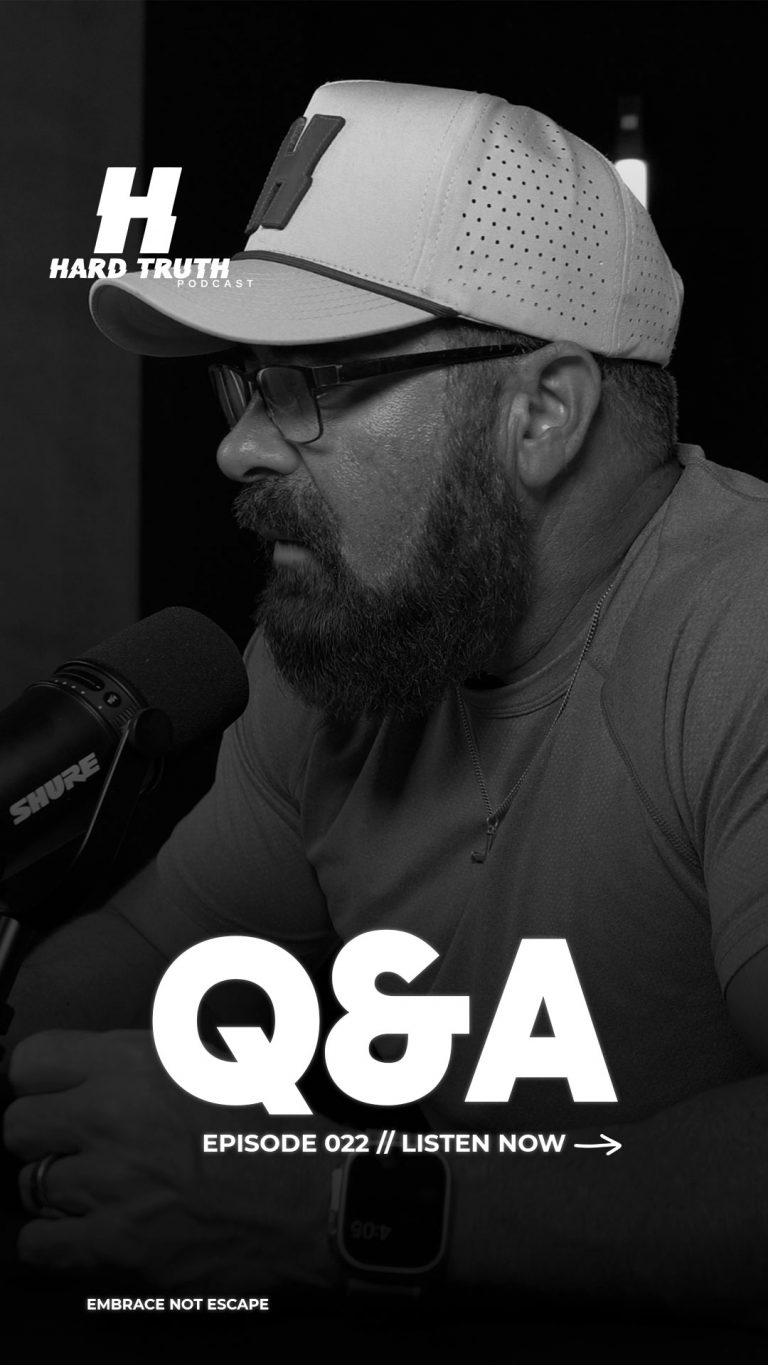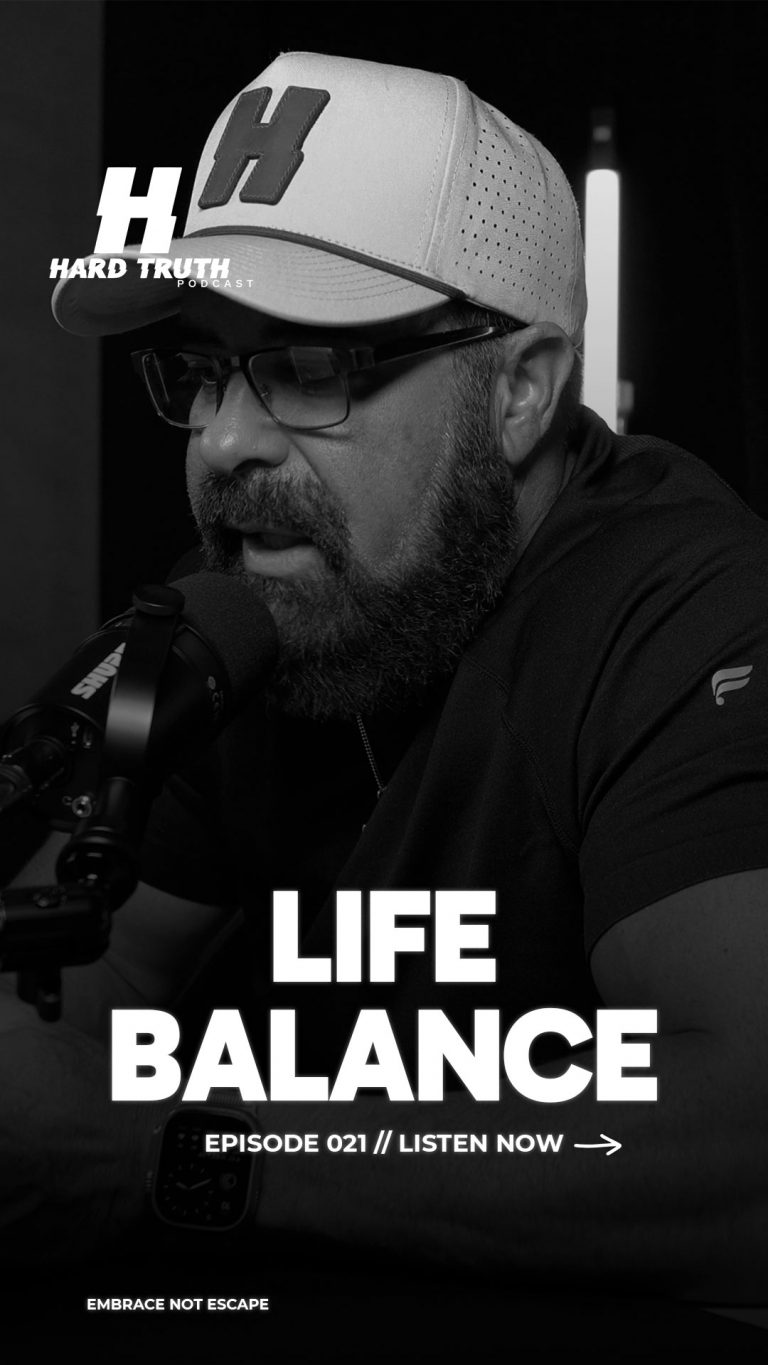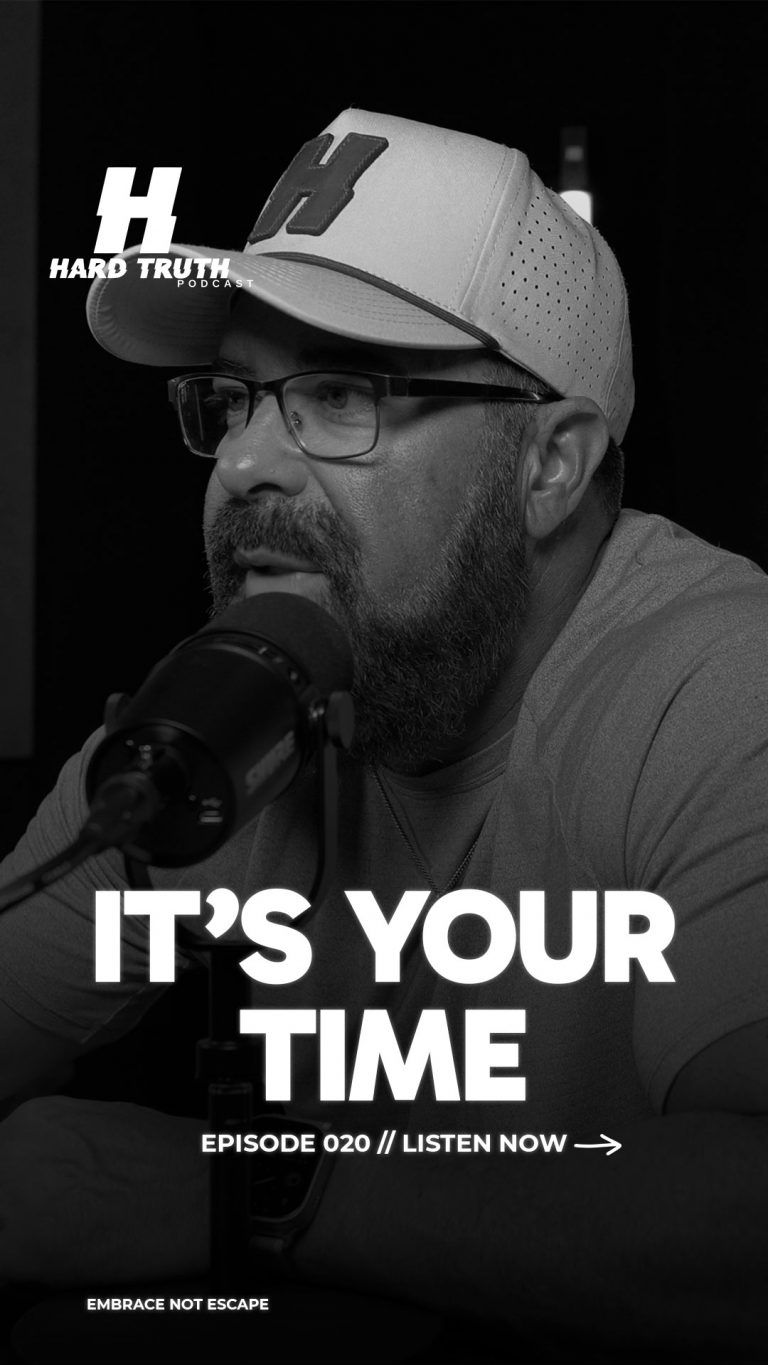Welcome back to The Hard Truth Podcast.
Today, we are gonna be talking about parenting in today’s society.
Any of you parents out there that have kids now, you know that it is a difficult time to raise kids.
But I’m gonna share with you 13 points that I feel like will help you and make a difference in your parenting style.
Well, as we dive in to parenting in today’s society, I want to put a disclaimer out that my kids are still in the process.
I have a 16-year-old boy and a 14-year-old boy, but I do want to share with you some things that’s worked real well with them.
And they have definitely a few years to go for me to be able to put a stamp of approval and say, you’re a man and proud to be your dad as far as the young man that you have became.
But they have done really, really well.
4.0 students succeeding in athletics, succeeding in society from learning how to serve, treat others the way they want to be treated.
And I want to share with you some things that’s really helped us and hopefully can make a difference in you parenting as well.
So I’ve got 13 different tips that I want to share with you today on today’s podcast.
And this is definitely a topic that is fun for me to talk about.
It’s something that is definitely something that’s on my heart on a daily basis.
As I teach my boys since they was young, I’m like my job is not to just raise good kids.
My job is to raise good young men.
So my boys, they hear it every day.
I try to practice what I teach.
And this is something that I feel like is very important for us as parents today, is not ignore the subjects that we don’t want to discuss, but to really confront those hard subjects and talk to your kids about them and definitely have an understanding of what we are trying to accomplish as parents.
So first tip, love and discipline.
Obviously it was going to be at the top.
You have to understand the importance of having unconditional love towards your kids.
And then also things that a lot of people don’t understand is a love to your spouse.
One of the things that my boys know is nothing gets in the way of mom and I’s relationship.
I love you boys, but the one thing that you’re going to understand is that is my wife and you never disrespect my wife.
And that is something that they have always understood.
So not only love towards my kids, but love towards your spouse.
Now, I also want to say this.
I am a man and I’m raising two boys.
So obviously, maybe I’m a little bit talking more about boys, but you may have girls and I feel like you can still use a lot of these tips into raising good young women as well.
But understand where I’m coming from.
I’m obviously going to be talking more about boys.
So I hope that does not offend you.
But love and discipline.
A little side note that I’ll put here.
Provide a home that is abundant in love and discipline with no stress, no drama, no yelling.
My boys, my wife, they understand in our home.
This is a safe place for us to be.
And there is not going to be yelling.
There’s not going to be screaming.
Something I see a lot of dads, especially, they’ll call me up and they said, man, I was just really stressed and my boy saw me stress.
And I’ll always ask them, why are you stressed?
You know, well, my job, this and that.
I said, man, let’s leave that at the office.
Let’s come home with a clear head and leave that at the office.
Because if your boys, your girls are always seeing you stress, they’re always seeing drama in your life, then that is not going to be a good pattern of behavior that they’re going to now take it upon, that if anything goes bad in my life, then I’ll see mom, I’ll see dad, always stressing, but love and discipline.
Now, I’m not going to talk to you about how to discipline your kids.
That’s something that you need to discover for yourself.
For two boys, and I was raised by good parents that had four boys, it definitely has worked best for us to use the ways of the past, so to speak, which is a leather strap to get their attention.
I’m not telling you that’s what you need to do, but that’s something that discipline, good discipline, knowing that when you make a mistake, there is going to be consequences.
Now, I see a lot of parents, they spend a lot of time on love with no discipline, and you’re going to see later on, I have parents call me, they’ll say, can you help me with my son?
He’s talking back to me, he’s yelling at me, and I’ll say, how old is he?
And they’re like 13, and I’m like, I don’t know if we can still make a change in this.
So understand if you have younger kids, start early with the two main principles of which is love and discipline.
You cannot just love and you cannot just discipline.
Those two have to be going strongly together.
Number two is spending time with your kids.
Now, I read a book early on, My Boys Were Small, and it was actually by Pastor Graham, and I’ll never forget this statement.
He said, kids don’t understand quality time, they just understand time.
I hear a lot of parents say, well, I don’t have a lot of time to spend with my kids, but when I do, it’s quality.
Remember that quote.
Kids don’t understand the difference.
They just want to spend time with you.
Whether that be at breakfast, turn off your phone, have them turn their phones off.
Put the newspaper up, visit with them.
Dinner, the same way.
Put the phones up, turn the TV off, visit with them.
Guys, it’s all about the time that you spend with your kids to let them know that you are here with them and you’re not looking for other ways or other video games to raise them.
You are looking to spend quality time, which is basically any kind of time that you can spend with them.
Number three is teach your kids hard work.
A lot of you heard my testimony in the first episode.
I actually was raised on a farm and ranch.
And I’ll never forget that my mom and dad over and over would just teach us working hard every day.
And at the time as a kid, you’re thinking, man, I just want to play.
I don’t want to work hard.
Now, I’m not telling you that a kid cannot have good enjoyment.
I’m going to get later into that as well.
They need to have other hobbies, other activities.
But if you will teach your kid how to work hard, I mean, if you go all the way back to the Bible days, the first thing that God gave Adam was a garden to take care of.
There is nothing like hard work, what it’s going to do for your kid’s future if you teach them how to work hard.
That will be something that they can carry into every arena of their life.
And in today’s society, once a kid gets out of college, I promise you that if he learns or she learns how to work hard, they will pass their competition with flying colors.
Guarantee, but teach your kids how to work hard.
Now, that does not start when they’re 12 or 13 or 16 or 17.
That starts with little things.
And when I say hard work, I’m not talking about taking a five-year-old, helping him clean out the flower bed and making him sweat all day.
But I am talking about if we have a five-year-old that’s helping us do the flower bed, we’re teaching him we can take water breaks.
We’re teaching her we can take water breaks.
But we’re going to complete this task, and we’re not going to stop until we complete this task.
And not only that, though, we are going to do this task to the best of our ability that we can.
That’s something that’s very lacking in today’s society.
My boys know it doesn’t matter if they’re walking down a street, they see some trash, and that’s not theirs.
We’re going to leave it better than what we found it.
We’re going to pick up that trash.
We’re going to do the things that maybe others are not going to be able to do or don’t want to do.
And those little things, through hard work, will prepare your kid to be very successful in life.
Number four is teach them to be tough.
Now, this is something that in today’s society is very controversial.
You know, we all about love and just make people feel good and that type of thing.
A Chinese proverb makes it real clear, and this is a quote that I read a long time ago.
It’s better to be a warrior in a garden than a gardener in a war.
You know, so I always say this to parents.
Provide shelter but not cuddling them in every situation.
Teach them how to be tough.
You know, one of the things that I love is martial arts, wrestling, any kind of activity that’s going to let them know that when the tough gets coming to them, they just continue to go through that process.
You can’t be weak mentally or physically.
You have to learn how to be dangerous and how to control it.
You have to know as you’re growing up your kids, your kids are growing up.
You’ve got to teach them to be tough mentally and physically.
How can we prepare ourselves that when we need to be tough, we can be tough and not have to worry about it?
Trust me, if you teach your kids to be tough, I’ll never forget my seventh grader.
He’s my youngest.
He went to football practice in Texas.
You cannot start football at school until your seventh grade.
He come home and he said, Dad, thank you after the first day of football practice.
And I said, for what?
And a lot of times my boys have thought that I’m like a drill sergeant.
And he looked me dead.
And he said, Dad, thank you for teaching me how to be tough.
He said, more than 75% of these kids couldn’t even run the sprints, couldn’t do the things because they was over there complaining their stomach hurt, their legs hurt, all these different things.
Teach your kids how to be tough.
Number five is let them fail and help them learn from it.
Then help them understand how to evaluate self and where we can get better.
Now, this is a subject that I could talk about for hours.
As I work with parents over and over, that will call me, and they will say, you know what, my coach is not, the coach is not playing little Johnny, and it’s all political and all these different things.
And over and over, I hear these complaints.
We want to get a trophy for everything, whether we win or we got seventh place.
All these problems are in society, is just creating a soft society.
And guys, you’ve got to let your kids fail.
You’ve got to let them strike out.
Then you’ve got to let them talk about it to you and figure out what we need to do to adjust.
You’ve got to let them fail at an art class.
You’ve got to let them make those mistakes.
And then you’ve got to sit down with them and don’t try to defend them.
Don’t say, oh, that’s okay, little Johnny.
You’ll get it next time.
Yes, you want to bring their spirits up, but you’ve got to say, Johnny, could it be that the reason you failed at this situation is because we was not prepared like what we need to be prepared?
Johnny, could it be that if you struck out three times this weekend, if we got 75 cuts in the batting cage all week next week and prepared a little better, we might perform a little better?
Whatever the situation is, your daughter in gymnastics did not get a good score.
I don’t know a lot about gymnastics.
I’m not very flexible working on it, but if they did not get a good score, we don’t sit there and say, oh, well, I can’t believe they didn’t give you a better score.
It’s horrible.
We got done wrong.
No, be a good evaluator of your kid and teach them how to be a good evaluator of self.
And what do we need to do to get better?
Number six is get them involved in athletics or some skill that they can compete in.
They need to know how to make goals and learn how to push themselves.
Now, I’m big into athletics, OK?
But when I say athletics, a lot of you listen and say, well, my son don’t like football.
My son don’t like basketball.
My son don’t like baseball.
I don’t care what it is.
Find some kind of skill that he can learn.
Try to perfect and go fail.
Learn, try to perfect, go fail.
Learn, try to learn in that competition.
It doesn’t matter if it’s playing the trumpet.
He needs to try and strive to be the best trumpet player that he can be in a school.
It doesn’t matter if it’s gymnastics.
It doesn’t matter if it’s golf.
It doesn’t matter if it’s tennis.
It doesn’t matter if it’s horseback riding.
Or, I don’t care what it is.
Find them an athletic something that they can compete and measure.
How good they are next to their peers, and then what we can do to push ourselves to go to the next level.
If you take a kid that’s 7, 8, 9 years old, something I did with my boys since they started competitive ball and 7 years old, is every year in January, they make goals and they have to write them down and bring them to me.
And you say, well, at 7 year old Jeremy, that’s a little bit too much.
Don’t you think a 7 year old writing goals?
No, it’s not about if he hits or misses those goals.
It’s the teaching of making those goals.
It’s the teaching of setting down with him or her and saying, here’s where we are now.
Where do we want to be in 90 days?
Okay, let’s measure this.
We are better now in 90 days.
Now, do you think if we make a new set of goals 90 days later, we can do that again?
The earlier you teach your son or daughter to be able to make handwritten goals and put them down and something they can measure from, and I promise you, they’re going to be able to take that platform that you’re teaching them, that foundation, and they’re going to be able to continue all the way through life, not just in athletics.
See, the athletics part, I love it because it’s a good training ground.
But when they get into business and college, they’re going to take that same foundation.
They’re going to make 90-day goals.
They’re going to make physical goals, their business goals, their financial goals, all these different things.
But that’s why I love athletic sports or getting your kid in a skill that they can push themselves to be better on a daily basis.
Number seven is teach them responsibility and the word trust.
Responsibility.
You know, my boys have been doing their laundry since they was very, very young.
They have to be responsible of their laundry.
They have to be responsible of doing the dishes in the afternoon.
They have to be responsible now of their vehicle.
You know, my 16-year-old, they have to be responsible for their grades.
It’s not dad’s job or mom’s job to run to them and fix a mistake because they was not responsible.
That’s something I see over and over in today’s society.
Oh, well, Johnny left his cleats, so I’m going to run them to Johnny.
I’m not saying there’s not a situation that you don’t run them to Johnny, but I’m telling you, if you’ll teach Johnny that he might need to run in his school shoes at a young age by the time he gets to high school, he’ll be remembering to pack his stuff.
He’ll be remembering to pack his lunch once he’s hungry.
Once he has goals that he’s trying to hit at 16, and he’s trying to gain 20 pounds, he’ll remember that night before to help prepare and figure out how much protein snacks he needs the next day.
But teaching your kids responsibility and trust.
Now trust, in my opinion, as a father, it starts with us.
If we say we’re going to do this, then you know what?
We have to honor that word.
You know, that bleeds over into our kids.
So when our kid sees that dad says this, this happens.
Mom says this, this happens.
Then that kid knows the importance of trust.
And that kid knows that if I put my name on something, I’m going to be like dad, I’m going to be like mom, and I’m going to follow through with that.
Responsibility and trust teach them those two on a daily basis through your example.
Number eight is educate them on how to train and what role nutrition has and show them by example.
They learn by watching you.
This is, this is something again, I could talk about, you know, for an hour and a half today.
And obviously time won’t allow that.
But, but educate them on how to train and how to use nutrition.
But the key is you be the example.
You know, I hear over and over parents calling me when their kids get older and they’re wanting to go to college and play athletics at a high level.
They’re like, man, little Johnny, don’t hit the gym, man.
Little Johnny’s eating, eating Twinkies, man.
Little Johnny’s eating Fruit Loops for breakfast.
And I look at them and I think, well, it’s probably because you’re eating Fruit Loops and you’re watching Netflix and little Johnny just eats Fruit Loops and runs upstairs and plays the video games.
If you want your kids to be that example that you want them to be for athletics, for getting into college, for having a good business career, whatever that situation may be, you may not want to hear this, but it starts with you being the example.
Schedule a 5K run and say, hey, we’re going to go do this 5K run together.
Now, we’re going to put out a plan.
This is what we are going to do leading up to that 5K.
This is what we’re going to be teaching you that when you’re tired, we’re going to go back a mile two, and we’re going to ask ourselves, how did we hydrate properly?
What fuel source did we put in our body?
You know, if you teach your kids at a young age, through your example, how to train and use nutrition, that is going to be something that follows them through their whole life.
You know, it’s been proven.
People say, well, I just have bad genetics, therefore I’m 250 pounds overweight.
90% of the time, or I’ll say 99% of the time, I have no facts to back this up other than examples.
I bet you I can find some research if you want me to.
But that is not genetics, that’s through habits.
And the habits that’s learned at home most of the time continue in their home.
And then it continues in the next home.
Break the traditional habits that you may have of not learning how to train, not pushing yourself, and not eating correctly.
You master it and then teach your kids how to do the same.
Number 10, excuse me, number 9.
This is something that’s close to my heart, because it’s been something that’s been really good for me all the way through 48 years old, is get them involved in outdoor activities and how to entertain themselves through free activities that can give them a chance to learn and recognize where their food sources come from.
Guys, this is key.
Outdoor activities for me and my family, we personally try to consume at least 50% of what we harvest ourself, whether it be tuna fish, mahi mahi, venison, deer meat, or venison, elk meat, whatever the situation may be.
Now, it’s probably cheaper to go to Costco than some of these hunts and fishing trips we go on.
There’s no doubt about that.
But what it does is it teaches the kids how to have respect for that animal, how to harvest that animal, how to process that animal, the work that goes involved in packing that animal out a lot of times.
You know, Pearson and Beckett will tell you the last two elk that they killed last fall, we had to pack them four miles down the mountain, go back up, get more, bring it back.
They will tell you that’s the best elk meat they’ve ever eaten in their life because the work that they put into it, they know how to vacuum seal it for it lasts a long time in the freezer.
They know all these different things.
Guys, it’s very, very important.
You say, well, I don’t really have a gun.
That’s not my thing.
Take them on a hike.
Show them what different trees look like and the name of the trees and the birds and all these different things.
Leave the phones at home.
Take them on a camping trip.
That’s one of the things I love about outdoor activities is leave the phone at home.
You know, when we are at home, my kids check on their phone at 9, 930 every night anyways.
That could be a whole other podcast that’s about the distractions of the phone.
But teach them that they don’t have to go to Topgolf and spend $200 in order to have fun.
They don’t have to go play video games or buy this or buy that to have fun.
Teach them outdoor activities, ways that they can entertain, ways that they can learn about life.
Teach them about the food source of where it comes from.
Take them on a local dairy farm and call a farmer up and say, you know what, we want to know where our milk comes from.
Can I bring my kids and tour the local dairy farm?
But learn how to teach your kids how to have fun without having to get on a phone, get on a computer, go to Topgolf and teach them where our food source comes from.
Number 10 is help them understand what we listen to and read is what we become.
Communication daily and weekly evaluations.
Now, this is something that is hard for parents to do because, you know, they get so busy at just making a living.
They get so busy trying to do all the things they need to do just to provide that they don’t understand what their kids are consuming in their mind.
All of you know that it matters what we eat from a food source.
It’s the same difference.
What those kids put in their mind is who they become.
I mean, us adults are the same way.
You know, so if I’ve got little Johnny is wanting to be a leader and he’s wanting to be an athlete, there’s some phenomenal books you can get on Amazon, letting him read one book every two weeks and then talking to him about that book, about how to train yourself, how to prepare yourself mentally, you know, teaching them different personal development audios that they can listen to.
But letting them understand if all you’re listening to is junk on those earpods over and over, then that’s what you’re going to become.
Talk to them though daily about this.
What book are you reading today, little Johnny?
You know, what kind of music are you listening to?
You know, what have we done to feed our mind?
What new skill have we learned this week?
You know, talking to them about that at breakfast and at dinner.
But doing those self-evaluations, what you don’t want to do is have no understanding of what your kids are putting in their mind from 10, 11, 12, 13, 14, and then call me or call someone else at 14 and say, why is my kid this way?
Because your kid has put junk in their mind from age 10 to 14 because you gave them a cell phone, and they didn’t know that what they put in their mind is who they became.
You didn’t spend that time with them at breakfast talking to them about what they’re reading, what they’re listening to.
You didn’t talk to them at dinner time.
You didn’t take them on a camping trip without a phone for two or three days and say, Johnny, you’re 13.
What are some of the things that you have the most interest in?
What are some of the things that you like about life the most?
Johnny, what are some of the things that you’re struggling with?
Tell me about your four good friends.
A little bit about their mom and their dad.
How many brothers or sisters do they have?
But you have to help them understand what they put in their mind on a daily basis.
And that’s the same for us adults.
That’s who they become.
Number 11 is take interest in what they enjoy.
Now, and then also the other part of that is show them how to give and serve, which I’ll talk about that in a few minutes.
But take interest in what they enjoy.
Now, this is something that has been challenging for me.
I’ve got a 16-year-old that is pretty much an identical example of myself.
He loves hunting and fishing.
I mean, he loves the outdoors.
I mean, he would rather be hunting something than doing anything.
He loves baseball.
My youngest, you know what?
He’s an athlete.
He loves lacrosse over baseball.
That’s okay.
You know, he will go on hunting trips because we do it as a family, but he don’t crave it like my 16-year-old.
So I have to spend extra time with him, figuring out what his interests are, and then helping him know that that’s okay to have different interests.
If you have more than one kid, they’re both going to be different.
I promise you.
And you just can’t love and discipline them the same way.
You’ve got to figure out what the interests are and become interested in their interests and spend time with them and those interests.
You can’t just say, well, I don’t like lacrosse, so I’m not going to your lacrosse game.
You know what?
I love lacrosse now.
I support that.
If he wants to play college lacrosse, that’s what we’re going to do.
You know, but understand you’ve got to take interest in what they enjoy.
If it’s art, my 14 year old, he loves drawing.
You know what?
I’ve bought him a sketch pad.
We try to feed that interest of what are we drawing today, Beckett?
I mean, we’re always trying to feed that interest.
The other part of that, that I said a few minutes ago, show them how to give and serve.
That could be a point by itself.
Show them how to give of their finances, you know, of someone, maybe it’s in need at a young age.
Show them how to serve.
You know, call the local church, the local food pantry.
Say, what can my family do for you this Thanksgiving for those that are underprivileged?
Show them and take interest with them, and say, our family is going to learn how to give and serve the underprivileged.
Number 12 is teach your kids how to treat others as you want to be treated.
Now, I was pretty gifted athlete.
I was pretty popular in my high school.
This is something that’s never, maybe it was taught to me by my parents, but I was just attracted to not being the jock.
I was attracted to seeing those kids, that maybe this is just God-given, I don’t know, that maybe was not as privilege, and I wanted to spend time with them.
Maybe the girls that didn’t get all the dates, those were some of my good friends.
Those that maybe was not athletes, that was considered nerds, is what they called them, they was my friends.
In high school, I was in the drama team.
At first, the drama team had really no one that wanted to go there.
Now, the drama team, after one athlete wants to do it, everyone wants to do it.
But teach your kids how to treat others as they want to be treated.
Don’t let them just go pick on Johnny because their friends are picking on Johnny.
Let them have a good understanding of, you know what, they’re picking on Johnny because maybe Johnny don’t have the nicer clothes on, but I’m going to take up for Johnny because Johnny is as important as I am, and I would not want people to treat me like they’re treating Johnny.
So I’m going to protect Johnny.
Teach your kids to treat them.
If any situation happens, talk to your kids and say, would you want to be treated that way?
No, therefore, we’re not going to treat someone that way.
Number 13, and this is what I end up on.
It’s the most important point.
Again, I could talk about this for a long time.
Show them how to be a man or a woman, whoever you are.
Now, this is so important because all of these things, you could write out all 13 of these tips.
And if you don’t show them how to be a man, you don’t show them how to be physically fit, how to follow a nutrition plan, how to follow a business plan, how to follow your financial goals, how to treat your wife with love and respect, how to date your wife, how to nurture your wife, how to have good communications with your wife, then they’re not going to know how to be a husband.
If you don’t show them how to love them, how to communicate with them, how to push them, my boys know I’m not here to be their best friend.
I’m here to mentor them and to train them and to be the best leaders that they can be, to be the best young men that they can be.
But if I don’t show them, they don’t know how to be a father.
You know, in society as a whole, that’s what’s really missing.
We throw our kids into the marketplace, and we want all the social media to teach them about things.
We want them to look at other areas and figure out life themselves.
If God has blessed you with a son or a daughter, he has given you the responsibility to show them how to be a man or a woman.
It’s up to you and your responsibility.
Share this with a friend or family member if one of these points or all of them made a difference to you.
Follow me on social media accounts and also jeremyfouts.com.
Thank you, guys, for joining The Hard Truth Podcast.
Yes.






